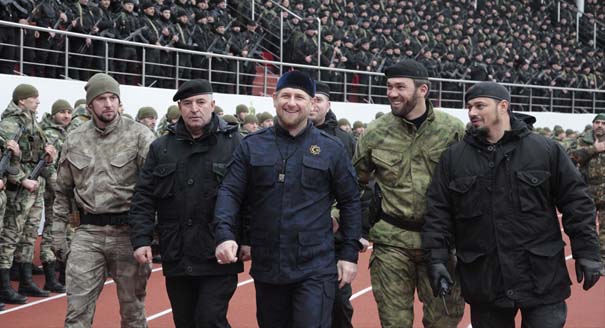Chechen leader Ramzan Kadyrov recently announced on live television that he is prepared to step down when his presidential term ends in April, leaving many to question his motives and wonder how Russian President Vladimir Putin will respond.
Before Kadyrov’s appearance on NTV on February 27, which coincided with the one-year anniversary of opposition leader Boris Nemtsov’s assassination, no one doubted that the Chechen leader would remain in power as long as Putin is president. Kadyrov has been the head of Chechnya since 2007, when he was named “President of the Chechen Republic.”
He gave up the title in 2011, when leaders of other Russian republics began irritating the Kremlin by using the same moniker. Chechnya is indeed unlike any other Russian republic. It receives enormous federal subsidies and its leader reports directly to the Russian president. Appropriately, Kadyrov once called himself “the president’s foot soldier.”
Kadyrov claims that he is ready to step down because he has achieved all his goals, and that there is already someone in Chechnya prepared to replace him. He has gone as far as to say that he is willing to work as a menial laborer if necessary after leaving office. More likely, however, Kadyrov knows that the Chechen people will reject his resignation and beg him to stay, thereby reinforcing his power and prominence.
Kadyrov’s gambit is about national-level politics as well. If Putin asks him to stay in office—the most likely outcome—this will reveal how indispensable Kadyrov is to the Kremlin and betray Putin’s weaknesses in Chechnya. Law enforcement and military officials in Moscow who have long hoped to rein in Kadyrov and his associates will be loath to accept this outcome. If Kadyrov remains in power, he will become untouchable; he will have free rein to act as he pleases, and his cadre will be greatly empowered.
The discussions surrounding his possible resignation also give the Chechen leader an opportunity to assess the loyalty of his inner circle. Some of his underlings may interpret his posturing as weakness and start looking for a new benefactor. Several post-Soviet presidents have tried this tactic, leaking information about their ailments and possible departure from power to assess their subordinates’ loyalty.
Let’s imagine a few less likely scenarios. Kadyrov could handpick a successor while still remaining the unofficial leader of the republic, like Putin did in 2008 when he temporarily left office and Dmitry Medvedev became president. This ostensibly innocent move could be rife with unforeseen consequences for Ramzan. Chechen politics is a dangerous business, and there’s no guarantee that his successor wouldn’t declare himself the republic’s true leader. This would be particularly messy if Kadyrov’s personal guard remained loyal to him.
Alternatively, facing pressure from law enforcement officials in Moscow, Putin may grow tired of Kadyrov’s unpredictability and his attempts at extortion. From the perspective of the security forces, activist Ilya Yashin’s recent report on Chechnya couldn’t have come at a better time: it convincingly demonstrates that Kadyrov’s antics are actively discrediting federal authorities. Indeed, Putin could replace Kadyrov, reminding the heads of other regional governments about the verticality of Russian power.
If he were forced out of office, Kadyrov would be rewarded with a “golden parachute”—a new appointment, probably at the federal level. He could become deputy prime minister responsible for “dialogue among civilizations,” or something to that effect.
Lastly and least probably, Kadyrov might sense that the tide is turning against him and leave office of his own volition. But the reality is that Kadyrov will, after all this, simply stay put.
